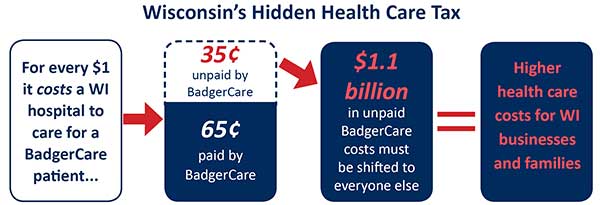Reimbursement and Coverage
Two out of three patients receiving care at a Wisconsin hospital are covered by either Medicare or Medicaid (BadgerCare). Both the federal Medicare and state-administered Medicaid programs underfund Wisconsin hospitals, causing a cost-shift onto everyone else who receives care at a hospital. This underfunding and resulting cost-shift has been called a “Hidden Health Care Tax” by Wisconsin businesses. Between Medicare and Medicaid, the government programs underfund Wisconsin hospitals by $3 billion a year – for hospital services alone.
WHA provides advocacy leadership with policymakers to increase resources for hospitals through Medicaid and Medicare, allowing hospitals to sustain and expand access to critical services. On a biennial basis, the Governor and Wisconsin legislature consider a state budget and standalone legislation impacting how hospitals and healthcare providers are reimbursed by Medicaid. WHA advocates with members of Congress and federal agencies, like the Centers for Medicare and Medicaid Services, on recent topics impacting resources available to hospitals including 340B, Medicare outpatient hospital service policies and policies impacting network adequacy and hospital billing.
Over 200,000 low-to-middle income Wisconsin residents depend on subsidized individual health insurance coverage on the exchange. WHA advocates at both the state and federal levels to enact policies that improve choice, competition and affordability in Wisconsin’s individual insurance marketplace, which includes plans offered through the exchange. A recent example of this policy leadership includes achieving bipartisan support in 2017 and again in 2019 for the Wisconsin Healthcare Stability Plan, a state-level reinsurance program created through the CMS 1332 waiver process that has reduced premiums in the individual market for the 2019 and 2020 plan years.
Starting in 2013, Wisconsin lawmakers created and increased funding to the Medicaid Disproportionate Share Hospital (DSH) program, an important hospital supplemental payment that helps offset Medicaid’s below-cost reimbursement and helps improve access to care for everyone. While Wisconsin’s DSH program remains much smaller than those in other states when compared to overall Medicaid expenditures, Wisconsin’s DSH program continues to provide important funding for hospitals serving patients living in poverty.

In 2017, the legislature also created a similar program called the Rural Critical Care (RCC) supplement program that provides similar assistance to 27 rural Wisconsin hospitals. A list of hospitals eligible for DSH and RCC can be found here.

